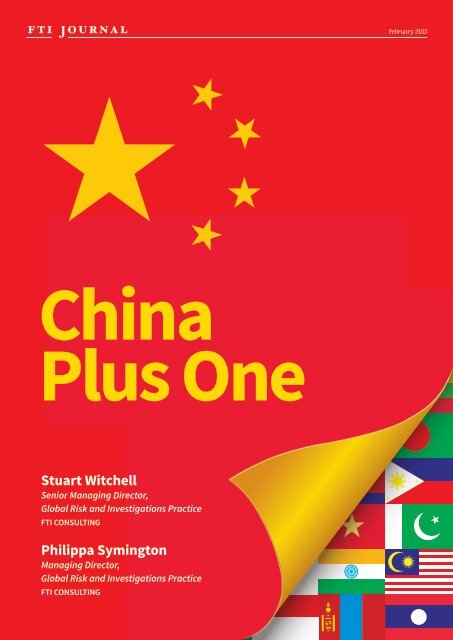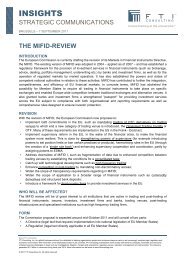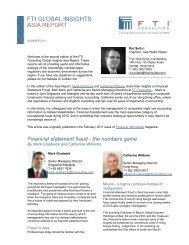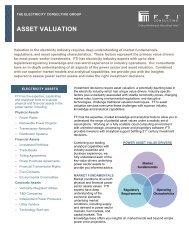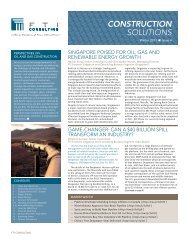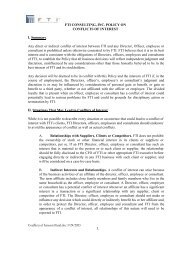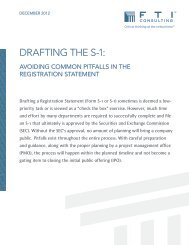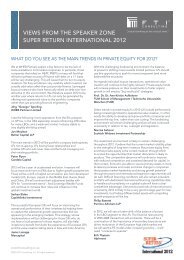Full article - FTI Consulting
Full article - FTI Consulting
Full article - FTI Consulting
Create successful ePaper yourself
Turn your PDF publications into a flip-book with our unique Google optimized e-Paper software.
February 2013<br />
China<br />
Plus One<br />
Stuart Witchell<br />
Senior Managing Director,<br />
Global Risk and Investigations Practice<br />
<strong>FTI</strong> CONSULTING<br />
Philippa Symington<br />
Managing Director,<br />
Global Risk and Investigations Practice<br />
<strong>FTI</strong> CONSULTING
February 2013<br />
For the last 20 years, many Western companies have invested<br />
in China, drawn by its low production costs and enormous<br />
domestic consumer market. But in recent years, the cost<br />
advantage has diminished, while other business challenges<br />
have emerged. As a result, many companies are looking to exploit<br />
opportunities in other growing Asian markets both to hold down<br />
costs and to reduce overdependence on China.<br />
The Problem — a Maturing<br />
Economy, Rising Wages and<br />
Disappearing Tax Incentives<br />
Over the past few decades, global<br />
corporations have been entering China<br />
to open factories and launch businesses<br />
in the services industries. This was<br />
motivated by an eagerness to access a<br />
booming Chinese market while taking<br />
advantage of relatively low production<br />
costs and wages.<br />
Initially, Western companies had their<br />
doubts about doing business in what<br />
they saw as a risky operating environment.<br />
But over the years, China has<br />
taken action to address many of the<br />
issues that concerned Western companies<br />
the most. High-profile arrests have<br />
been made by Chinese authorities to<br />
show they are serious about cracking<br />
down on corruption and intellectual<br />
property theft. They also have stepped<br />
up monitoring of exports in certain<br />
sectors to discourage counterfeiting and<br />
to improve the quality of exported toys,<br />
clothing, footwear, accessories, appliances<br />
and furniture.<br />
These actions helped the Chinese<br />
economy expand to become the<br />
second-largest economy in the world<br />
(smaller only than the U.S. economy).<br />
But as the Chinese economy has<br />
matured, some of the advantages that<br />
proved so alluring to Western companies<br />
have diminished. For instance,<br />
China no longer ranks as one of the<br />
cheapest labor markets in Asia. A<br />
shortage of qualified workers has led to<br />
wage inflation; 10% in 2012 according to<br />
Standard Chartered. During the coming<br />
years, forecasts suggest that Chinese<br />
labor shortages could grow, in part,<br />
as a result of China’s policy permitting<br />
families to have no more than one<br />
child each.<br />
In addition, some of the most meaningful<br />
tax incentives for Western companies<br />
have been eliminated. Since 2009,<br />
most of the tax privileges that foreign<br />
invested enterprises formerly enjoyed<br />
have expired. Although it still is possible<br />
to obtain tax incentives in certain industries<br />
(e.g., the high tech sector) and<br />
regions, the process of obtaining these<br />
incentives has become more difficult<br />
to navigate. Meanwhile, despite some<br />
progress, there remain concerns about<br />
other areas. Enforcement of intellectual<br />
property rights is inconsistent; there is<br />
growing fear of reprisals for business<br />
decisions against Chinese interests;<br />
there are occasional public protests<br />
such as the recent flare-up of anti-Japan<br />
sentiment that caused widespread<br />
disruption to Japanese businesses;<br />
and there is an increased frequency of<br />
labor disputes.<br />
The Solution — Dive Deeper<br />
and/or Branch Out<br />
To hold the line on the cost of doing<br />
business in China, some multinational<br />
companies are opening new facilities in<br />
China’s interior, where wages continue<br />
to be lower than those on the coast. For<br />
example, consumer packaged goods<br />
giant Unilever has moved some of its<br />
manufacturing facilities for products<br />
such as laundry powder and tea to Anhui,<br />
a traditionally agricultural province<br />
located 270 miles up the Yangtze River<br />
from Shanghai. Computer maker Hewlett-Packard<br />
(HP) has taken the same<br />
approach, spending $3 billion on a laptop<br />
factory in Chongqing, a city in the<br />
southwest part of the country. And HP<br />
announced in April 2012 that it would<br />
add a printer factory in Chongqing.<br />
Still, while moving to the Chinese interior<br />
may help alleviate wage pressures,<br />
there is a tradeoff. It takes longer and<br />
costs more to ship products from the<br />
Chinese heartland to overseas markets.<br />
For companies such as Unilever selling<br />
to the domestic Chinese market, that<br />
may not be a concern. And firms like HP<br />
that make relatively small, high-value<br />
products may continue to find that the<br />
benefits of moving inland outweigh the<br />
costs. But there are many companies in<br />
other industries that will find it hard to<br />
justify a move away from the coastline.
February 2013<br />
MYANMAR<br />
For those companies, it may<br />
make more sense to branch out<br />
by opening production facilities<br />
in other Asian countries, including<br />
Vietnam, Indonesia, Thailand<br />
or Myanmar. This China plus One<br />
strategy has several benefits:<br />
THAILAND<br />
VIETNAM<br />
MALAYSIA<br />
INDONESIA<br />
Cost control — Workers in these<br />
Southeast Asian countries generally<br />
are less expensive to hire than Chinese<br />
employees. By 2010, China already<br />
had become the third-most-expensive<br />
labor market in Asia, and labor costs<br />
have continued their upward trajectory.<br />
A March 2012 survey by Standard<br />
Chartered shows annual wage inflation<br />
running at 10 percent.<br />
Risk diversification — Spreading<br />
production across several markets<br />
hedges future investment in China by<br />
leaving producers less vulnerable to<br />
supply chain disruptions, currency fluctuations<br />
and tariff risks in any individual<br />
market.<br />
New market access — For an<br />
economy such as Myanmar, the world’s<br />
newest frontier market that seems<br />
poised for rapid growth, it can be an<br />
advantage to become established in the<br />
country early.<br />
One of the companies that has adopted this strategy is Intel, which made a big bet on China plus One in 2010, when the organization<br />
opened a $1 billion chip plant in Vietnam. As it becomes more expensive to do business in China, these Southeast Asian<br />
nations are actively wooing outside investors. Included among the most aggressive self-promoters has been Indonesia, which<br />
touts generous tax incentives for Western companies and has launched a marketing campaign that boasts of the country’s low<br />
wages and growing workforce.<br />
Plus Which One Deciding Where to Diversify<br />
For companies choosing to diversify away from China, the choice of where else to go is not a<br />
simple one, with each country presenting its own challenges. There are several key considerations<br />
when selecting an additional regional outpost, including:<br />
Labor costs — Average labor costs<br />
are similar in China and Thailand but<br />
are significantly lower in countries such<br />
as Vietnam, Indonesia and Myanmar.<br />
But these rates can be misleading since<br />
they can fluctuate widely within countries.<br />
In China, costs vary from as little<br />
as $2,000/year in western provinces to<br />
$6,000/year in Shenzen, a port city and<br />
manufacturing center on the east coast.<br />
Infrastructure — An Indian think<br />
tank published a ranking of East Asian<br />
countries by infrastructure in 2011.<br />
While it put China and Thailand in the<br />
middle group for infrastructure attainment,<br />
Vietnam, Indonesia and Myanmar<br />
were among the bottom six counties<br />
in East Asia. In Myanmar, for instance,<br />
mobile phones and Internet penetration<br />
rates are both below 5 percent, rolling<br />
blackouts occur on a daily basis and<br />
many streets regularly flood to kneehigh<br />
levels during the rainy season.<br />
Country risk — Country risk encompasses<br />
a wide range of social and<br />
institutional challenges that vary from<br />
one country to the next. In Vietnam,<br />
for instance, the main operational risks<br />
include corruption, lack of accountability,<br />
low transparency and the challenges<br />
of dealing with a burdensome bureaucracy.<br />
Meanwhile in Thailand, the most<br />
acute country risk is the social instability<br />
caused by a deep division between rural<br />
poor “red shirts” and the mostly urban<br />
middle class “yellow shirts.” Companies<br />
operating in Indonesia face a different<br />
challenge — the relatively high risk of<br />
terrorism and kidnapping that exists in<br />
certain parts of that country. A recent<br />
cross-border risk analysis showed that<br />
all the Asian alternatives are riskier than<br />
China, but that some of them (including
February 2013<br />
Thailand, Indonesia and Vietnam) are<br />
not significantly so.<br />
Market size — If companies plan to<br />
sell domestically, it makes sense to consider<br />
the size and attractiveness of local<br />
markets, as well as how those markets<br />
likely will change over the next decade.<br />
China has the highest per capita wealth<br />
and, by far, the largest population (see<br />
Table 2), but some markets (such as<br />
Thailand) have comparable per capita<br />
wealth, and other markets also have<br />
large populations.<br />
Major Customers — Sometimes the<br />
decision of a single manufacturer has<br />
ripple effects. When Ford Motor Company<br />
announced in mid-2010 that it was<br />
spending $450 million to open a major<br />
plant in Thailand, a number of the automaker’s<br />
suppliers soon began making<br />
plans for Thai operations, while banks<br />
and other services companies started<br />
looking for ways to serve what could<br />
become a major auto export base.<br />
Table 1<br />
Wage Overheads in Emerging Asia<br />
Country<br />
Average minimum annual salary<br />
(worker, Intl. $)<br />
Average mandatory welfare<br />
(% against salary)<br />
Total labor cost<br />
(Intl. $)<br />
Bangladesh<br />
798<br />
n/a<br />
798<br />
Cambodia<br />
672<br />
n/a<br />
672<br />
China<br />
1,500<br />
50<br />
2,250<br />
India<br />
857<br />
10<br />
943<br />
Indonesia<br />
1,027<br />
6<br />
1,089<br />
Laos<br />
1,057<br />
9.5<br />
1,157<br />
Malaysia<br />
4,735<br />
23<br />
5,824<br />
Mongolia<br />
2,004<br />
n/a<br />
2,004<br />
Myanmar<br />
401<br />
n/a<br />
401<br />
Nepal<br />
1,889<br />
n/a<br />
1,889<br />
Pakistan<br />
984<br />
7<br />
1,052<br />
Philippines<br />
2,053<br />
9.4<br />
2,246<br />
Sri Lanka<br />
1,619<br />
n/a<br />
1,619<br />
Thailand<br />
2,293<br />
6.9<br />
2,451<br />
Vietnam<br />
1,002<br />
15<br />
1,152<br />
Source: IMF World Economic Outlook Database, October 2010<br />
Managing the Risks — Finding a reliable partner, avoiding corruption and smoothing the transition<br />
In most cases, a reliable local partner is invaluable for local investors looking to enter a new Southeast Asian market. Clearly, investors<br />
should take care to perform thorough due diligence on any prospective partner, not only probing the company’s current<br />
and past financial performance but also track record and reputation in both the domestic marketplace and abroad.<br />
Geographical considerations are important as well, as illustrated by one multinational firm that recently entered Vietnam with<br />
the intention of expanding throughout the country. The company’s partner had business relationships in Ho Chi Minh City but<br />
not in Hanoi, Vietnam’s other key business center.
February 2013<br />
Table 2<br />
Per Capita Gross Domestic Product and Population<br />
Population<br />
1,500,000,000<br />
1,200,000,000<br />
900,000,000<br />
600,000,000<br />
300,000,000<br />
0<br />
China<br />
Thailand<br />
Indonesia<br />
Vietnam<br />
Myanmar<br />
10,000<br />
8,000<br />
6,000<br />
4,000<br />
2,000<br />
0<br />
Gross Domestic Product per Capita/US$<br />
Population<br />
Gross Domestic Product per Capita/US$<br />
Sources: Census figures, official and United Nations estimates, World Bank and IMF<br />
As the multinational discovered, the<br />
two cities have very different business<br />
cultures. To complete the expansion,<br />
the company had to join forces with a<br />
second partner already well-established<br />
in Hanoi.<br />
Business norms in the country should<br />
be understood, especially in light of<br />
anti-corruption regulations in the United<br />
States and elsewhere that may prohibit<br />
common local practices, including<br />
the giving of bribes. Bribery is a major<br />
problem in many developing nations, as<br />
noted by their relatively low ranking on<br />
Transparency International’s Corruption<br />
Perception Index. Third-party middlemen<br />
may be engaged to advise on transactions,<br />
including as go-betweens for<br />
companies and officials, related to activities<br />
that are less transparent. A survey<br />
by the University of the Thai Chamber<br />
of Commerce and the Anti-Corruption<br />
Network, for instance, finds that companies<br />
in Thailand typically must spend<br />
up to 35 percent of a project’s budget on<br />
bribes to win government contracts.<br />
Tolerance for local customs that might<br />
be considered bribery can expose multinationals<br />
to Foreign Corrupt Practices<br />
Act (FCPA) compliance risks. Offenses<br />
against the FCPA (or the UK Bribery Act,<br />
for instance), even by low-level employees,<br />
can result in substantial fines and<br />
damage to a company’s reputation.<br />
In 2011, global insurance broker Aon<br />
announced settlements with the U.S. Department<br />
of Justice, the U.S. Securities<br />
and Exchange Commission (SEC), and<br />
the UK Financial Services Authority (FSA)<br />
for paying bribes in Bangladesh, Indonesia,<br />
Myanmar, Vietnam and other countries<br />
to government officials responsible<br />
for awarding insurance contracts. Aon<br />
agreed to pay a $1.76 million fine and<br />
simultaneously settled with the SEC for<br />
more than $14.5 million in disgorgement<br />
and pre-judgment interest. The FSA<br />
imposed its own fine of £5.25 million.<br />
If a move into another Asian country<br />
involves scaling back on Chinese operations,<br />
there are further risks to manage.<br />
Sales from remaining Chinese facilities<br />
may plummet if customers or employees<br />
have negative reactions to the move. For<br />
example, more than 100 workers blockaded<br />
a Tesco grocery store in the eastern<br />
Chinese city of Jinhua last year, occupying<br />
entrances and exits around the clock<br />
to prevent shoppers from entering. The<br />
market was slated to close at the end<br />
of the year, and the workers were up in<br />
arms over wages and redundancy terms,<br />
according to local news media.<br />
From time to time, dismissed Chinese<br />
workers have been known to become<br />
violent: stealing equipment, damaging<br />
property and even engaging in<br />
“bossnapping” — seizing executives and<br />
demanding significant compensation for
February 2013<br />
workers. After news of a major company<br />
layoff at the Tonghua Iron and Steel<br />
Group in Jilin province in July 2009, for<br />
example, angry workers rioted and beat<br />
to death a corporate executive.<br />
To contain the risk of such disturbances,<br />
any shift away from Chinese production<br />
must be carefully planned and executed.<br />
It is essential for companies to negotiate<br />
with labor unions and relevant<br />
government officials to ensure a smooth<br />
transition and avoid bad publicity.<br />
Despite the challenges of operating<br />
in China, foreign companies still will<br />
be investing there for some time to<br />
come. China has a massive population,<br />
remains the world’s second-largest<br />
economy and continues to be an attractive<br />
market. Inward investment to China<br />
for the first six months of 2012 was $59<br />
billion, down only 3 percent from the<br />
previous year, and many foreign companies<br />
are prospering there.<br />
But as doing business in China becomes<br />
a more expensive proposition, multinationals<br />
are relying less on China alone<br />
as an Asian foothold. They are increasingly<br />
spreading their bets by investing<br />
in other regional markets to gain cost<br />
advantages, access new markets and<br />
diversify their exposure to various risks.<br />
Many of these Southeast Asian investments<br />
promise to deliver attractive<br />
returns but only for those companies<br />
that have done their homework.<br />
Stuart Witchell<br />
Senior Managing Director, Forensic<br />
and Litigation <strong>Consulting</strong>, Global Risk<br />
and Investigations Practice<br />
Philippa Symington<br />
Managing Director, Forensic and<br />
Litigation <strong>Consulting</strong>, Global Risk<br />
and Investigations Practice<br />
For more information and an online version of<br />
this <strong>article</strong>, visit ftijournal.com.<br />
The views expressed in this <strong>article</strong> are those of the author and not<br />
necessarily those of <strong>FTI</strong> <strong>Consulting</strong>, Inc., or its other professionals.<br />
©2013 <strong>FTI</strong> <strong>Consulting</strong>, Inc. All rights reserved.


